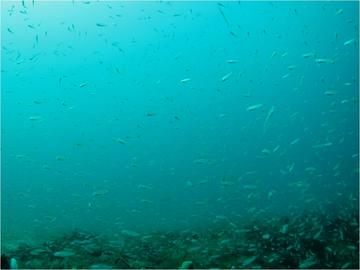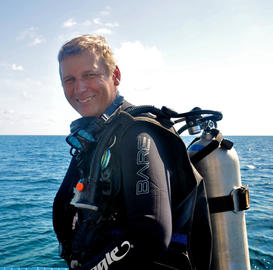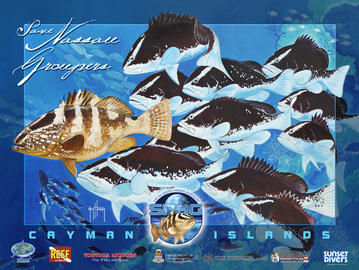Author: Christy Pattengill-Semmens, Ph.D., Director of Science
REEF Advanced Assessment Team Member, Dave Grenda, recently co-authored a paper documenting behavioral observations of young Great Barracuda occurring on live bottom sub-tropical reefs primarily at Gray's Reef National Marine Sanctuary off the coast of Georgia. For the past three years Dave assisted University of Connecticut researcher, Dr. Peter Auster, in studying behavioral interactions of piscivores and their prey. During REEF surveys on these cruises, Dave and the other researchers documented young-of-year (YOY) Great Barracuda (those individuals that had very recently settled to the reef, and were between 2-3 inches in length) hunting YOY Tomtate and Silverside that were taking refuge under ledges. Groups of YOY Barracuda would attack, capture, and consume the prey. Prey that escaped the Barracuda retreated to reef edges and were often consumed by bottom-dwelling adult piscivores such as Black Sea Bass, Bank Sea Bass, and Scamp Grouper. These findings indicate that given the strong functional role the young Barracuda have on driving species interactions, greater attention should be given to the roles played by the wider diversity of YOY piscivores recruiting to reef communities. The paper was recently published in the scientific journal Southeastern Naturalist. You can find a link to this and all published papers that have included REEF data on our Publications page.
Author: Sasha Medlen, REEF Membership Coordinator
REEF members are at the heart of our grassroots marine conservation programs. Over 43,000 divers, snorkelers, students, and armchair naturalists stand behind our mission.
This month we highlight Dave Grenda (REEF member since 1998). After retiring from the military, he became a volunteer, divemaster, and an American Academy Of Underwater Sciences Scientific Diver at the Florida Aquarium in Tampa. Dave has conducted over 1,800 REEF surveys and is a Level 5 Expert surveyor. In addition to his own diving activities, Dave has participated in numerous research projects, including numerous REEF Advanced Assessment Team trips, Nassau grouper tagging in the Caymans, mutton snapper spawning in the Dry Tortugas, piscivore cooperative hunting research off Georgia (see "Putting it to Work"), queen conch population surveys in St. Croix, Aquarius undersea laboratory support in Key Largo, Tampa Bay Civil War shipwreck archeology, Paleolithic Indian archeology in North Port Florida, coral spawning in the Flower Gardens and Key Largo, Gulf Red Tide recovery, reef health assessments with the Living Oceans Foundation in the Caribbean, point/transect fish surveys throughout the Keys, and collecting exhibit animals for aquaria educational displays. Here's what Dave had to say about REEF:
When and how did you first hear about REEF? What is your favorite part about being a REEF member? I became involved with REEF after attending a fish ID lecture at the Florida Aquarium given by John Pitcarin - a founding REEF staff member. Being a REEF member has opened an entirely new world to me. The fish identification skills I've acquired through REEF has opened many doors for me as a citizen scientist. I'm extremely grateful for the many opportunities I've been provided through my association with REEF. Attaining Expert survey level has enabled me to join numerous research efforts with NOAA, National Park Service, Universities, Aquaria, and of course REEF itself. Working with marine scientists has been very interesting and those scientists have relied extensively on my fish identification skills that I've acquired during my REEF survey diving. While these scientists knew their particular specialty very well, they were often rusty in general fish identification. I quickly became a valued member of their team, treated as an equal colleague, and sought after for future projects.
In your opinion, what is the most important aspect of REEFís projects and programs? Doing REEF surveys not only provides valuable data, it's a great way of "giving back" (helping the aquatic environment), but it also greatly enhances your diving enjoyment. What I like about the REEF survey method is that it can adapt to any type of dive site - regardless of visibility, current, depth, etc. While other divers might be disappointed at the visibility, or the failure to see certain animals (like sharks, turtles, eels, etc.), I will have had a great dive doing a REEF survey. I see more during my dives by doing surveys and I get excited at a rare sighting and adding a new species to my lifelist.
Do you have any surveying, fishwatching, or identification tips for REEF members? What new fish ID'ers need to do is SLOW down. It's much easier to see the movement of a cryptic fish, or just about any fish, when you aren't moving. If conditions allow, I'll start my dive by hovering in the water column. I'll write down every species I see as I slowly make a complete turn - looking in the water column as well as on the bottom below. To get the most species from each dive site, I'll try to hit as many different environments as possible (sand, rubble, top/middle/bottom of the reef, shallow/deep, etc.). Bring a flashlight to look into crevices and every tube sponge. It also helps to use the REEF database to know what species have been previously sighted at your dive destination. Before the dive you can acquaint yourself with the descriptions of new fish you might see there, so if you do come across that new fish, you'll already know how to identify it. Chance favors the prepared mind. You should also jump at the chance to dive with other fish watching experts. I've learned so much and so quickly by diving with other REEF folks - gaining confidence, learning new techniques, and just sharing wonderful fish stories.
Author: Janna Nichols, REEF Outreach Coordinator
REEF is proud to partner with over 130 dive shops, dive clubs, individuals, and other organizations as REEF Field Stations.
Our outstanding Field Station this month is the New England Aquarium, and their affiliated dive club, based in Boston, Massachusetts. Begun in 1975, the New England Aquarium Dive Club (NEADC) is one of the world's oldest, largest, and most active dive clubs. They host an annual event for Northeast divers in conjunction with REEF's Great Annual Fish Count (GAFC). This past July, they hosted their 10th annual GAFC event, and over 90 divers submitted 100+ surveys. The event took place simultaneously at 8 dive sites in Massachusetts and Maine. After the morning surveys, divers gathered for a feast and to distribute over $8,000 in prizes at Stage Fort Park. The event not only gathers important data, but it also introduces divers to REEF surveying and encourages them to continue surveying on their dives throughout the year. Local REEF volunteers, Bob Michelson and Holly Martel Bourbon, help ramp up the event by offering fish ID classes in the preceding months.
The Northeast is a cold water dive location, with REEF surveyors commonly finding Cunner, Winter Flounder, Striped Bass and Rock Gunnel. However, they have the added bonus of having some tropical fish find their way into the area as waters warm up in the summer. REEF staff are currently working with Bob and Holly to implement an invertebrate monitoring program into the Northeast REEF program. Thank you New England Aquarium Dive Club for promoting REEF and the volunteer survey project in the NE!
Author: Christy Pattengill-Semmens, Ph.D., Director of Science
Acclaimed marine artist and conservationist, Dr. Guy Harvey, joined the Grouper Moon Project team in 2011 to document the research being conducted on the Nassau grouper spawning aggregation on Little Cayman. Dr. Harvey and videographer, George Schellenger, spent 7 days in the field with scientists from REEF, the Cayman Islands Department of the Environment, and Oregon State University. The culmination of their work came together in a documentary called "The Mystery of the Grouper Moon", which was premiered to a packed house at the Harquail Theatre on Grand Cayman in September. Since that time, Dr. Harvey has been busy showing the documentary to local schools and promoting grouper conservation to generations of future Caymanians. The film will soon be available online for REEF members to watch, stay tuned. Inpsired by his time underwater with the grouper, Dr. Harvey created a painting of the aggregation that is featured on the documentary promotional poster. The original artwork will soon be available for purchase, with all proceeds going to REEF to support the Grouper Moon Project. To read more about the documentary, check out this article in the Cayman Compass. We are excited to have Dr. Harvey as a collaborator on this important REEF program.
Author: REEF Staff
As part of our 2012 Field Survey trip lineup, REEF Director of Special Projects, Lad Akins, is leading Lionfish Research trips to Belize and Dominica. If you haven't checked out our 2012 REEF Field Survey trip schedule - check it out online at www.REEF.org/trips. We have an exciting list of destinations planned. These trips offer a great introduction to fish identification for novice fishwatchers, and are a fun way for experienced surveyors to build their life list while interacting with fellow fishwatchers. REEF staff, board members, and other REEF instructors lead these trips, and each features daily classroom seminars and a full diving schedule. Additional 2012 destinations include: Nevis, San Blas Islands in Panama, San Salvador in the Bahamas, Sea of Cortez, Hornby Island in British Columbia, Bermuda, the British Virgin Islands, and Cozumel. We hope you will join us.








